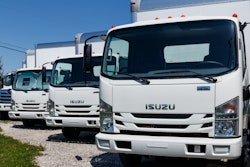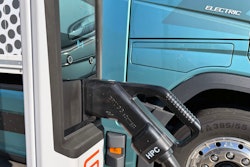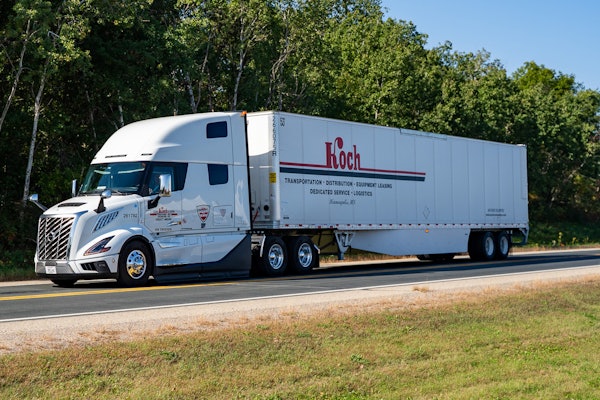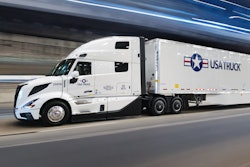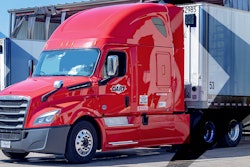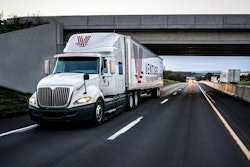Battery-electric trucks are here and available to purchase from all of the major OEMs, but there are limitations to the technology – range being front and center for the biggest portion of the trucking industry.
What’s also here and available, though mostly just on the West Coast, is renewable diesel, which new research has found can help solve the range issues of battery-electric while also drastically lowering carbon emissions without the large up-front costs.
American Transportation Research Institute Vice President Jeff Short is back on the 10-44 this week to talk about the group’s latest research that compares renewable diesel to battery-electric in a few different areas.
[Related: Renewable diesel a more effective tool to decarbonize trucking than BEV, report says]
Contents of this video
00:00 10-44 intro
00:30 Renewable diesel and battery-electric
03:10 What is renewable diesel?
06:55 Biodiesel vs. renewable diesel
08:43 Comparing environmental benefits, operational benefits, and costs
11:21 Operational benefits of renewable diesel
14:04 Cost difference of equipment
Speaker 1 (00:00):
CCJs 10 44 is brought to you by Chevron Delo, heavy duty diesel engine oil. Now there's even more reasons to choose Delo
Speaker 2 (00:09):
In the push to decarbonize trucking. Renewable diesel might just hold the answers to the long haul problem
Speaker 1 (00:15):
You're watching. CCJs 10 44, a weekly episode that brings you the latest trucking industry news and updates from the editors of CCJ. Don't forget to subscribe and hit the bell for notifications so you'll never miss an installment of 10 44. Hey everybody, welcome back. I'm Jason Cannon and my co-host, as always is Matt Cole. Battery electric trucks are here and are available purchase from all of the major OEMs, but there are limitations to the technology range being front and center for the biggest portion of the trucking industry.
Speaker 2 (00:45):
What's also here and available though mostly just on the West coast, is renewable diesel, which new research has found can help solve the range issues of battery electric while also drastically lowering carbon emissions without the large upfront costs. American Transportation Research Institute Vice President Jeff Short is back on the 10 44 this week to talk about the group's latest research that compares renewable diesel to battery electric in a few different areas.
Speaker 3 (01:09):
Our past research, we've done several studies looking at alternative fuels. They weren't specifically on renewable diesel, but there's of course, as everyone knows, been a push to decarbonize the industry and this has come from within the industry, from company setting internal goals, and also it's been mandated by regulatory agencies. In particular, the state of California has been pushing the industry in this direction towards zero emissions and really the main goal is to lower CO2. So we've taken a look at CO2 in particular, battery electric vehicles, Bev trucks, I'll call our one option. We looked closely at Bev trucks in the past. We found that there were electricity infrastructure issues. We would need 40% more electricity to fuel all vehicles in the US with electricity that includes trucks and cars, but trucks would take a good portion of that charging those trucks in. Oftentimes remote areas far away from cities where trucks park overnight.
(02:20):
That represented a challenge as well as the amount of materials needed for the batteries. Tons and tons, but good percentages of known reserves on the globe would have to go to US vehicles and we saw that as yet another challenge. And then we also looked at the actual emissions from zero emission vehicles and found that, and I'll get to this in a moment, found that battery electric vehicles only decreased CO2 emissions 30% from diesel. I was surprised that that number was a little better, but we also looked at that point, looked at renewable diesel and some other biofuels and other options, and renewable diesel looked a lot better and that's when we thought, let's go in this direction.
Speaker 1 (03:10):
What could be the biggest benefit of renewable diesel to trucking companies is that it would require no change whatsoever to the diesel powered trucks that they already run in their fleet.
Speaker 3 (03:19):
It's a fuel that is produced to be chemically identical to petroleum diesel. It's absolutely identical to the diesel that is made out of crude oil that comes from the ground. So it can be mixed in with petroleum diesel in any amount or it can be used as a standalone. You can completely run your truck, your fleet forever. If you have access to renewable diesel, you can run it on that. It's a drop in fuel and works on diesel trucks that have existed for decades. You wouldn't have to replace those trucks. That's really important. So what's it made of? In some cases it's made from stuff nobody wants waste streams like used cooking oil tallow, which is leftover from meat production. It's also made from crops corn oil. So when let's say you're growing corn and processing it for ethanol, there's also oil leftover and that can be used to make diesel, soybean oil, canola oil, those sort of things. There's also research going into non-food based feed stocks such as, let's say, waste products, forest waste products, even just trash folks are trying to figure out all different sources of feedstocks as well as algae. That's something that's been going on for a long time and hopefully that'll be promising at some point in the future. These things are difficult to move forward, these new sources, but when they do move forward, they'll be pretty fantastic. So right now we're looking at used cooking oil, vegetable oils, and tallow as major sources to make this stuff. Today.
Speaker 2 (05:05):
Biodiesel is another alt fuel that has gained traction in trucking, but renewable diesel has overtaken it in popularity in recent years. Jeff explains why after a quick word from 10 44 sponsor Chevron lubricants.
Speaker 4 (05:17):
These past few years have been less than easy. We've encountered challenges we never imagined we'd ever have to deal with from makeshift home offices and video meetings to global supply chain uncertainty, price instability, market disruptions, and everything in between. Delivering the level of services and products our customers had come to expect was difficult for all of us. We can't change what's behind us, but we can definitely learn from it. We can adapt, evolve, and take steps to reset our thinking, adapt our strategies, and restore your trust in us to better meet your needs now and in the future. That change begins today. Today we break with convention and introduce a rebalance line of Delo heavy duty engine oils. We've reduced our product line from four categories to two consolidated and simplified. This lineup removes complexity from the manufacturing processes, enhancing price stability and supply chain reliability so you can trust you'll have the premium products you need to keep your business always moving forward. Our break with convention optimizes the delo lineup to allow you to provide your customers with the best synthetic blend and synthetic heavy duty engine oils in the market, fully available at prices you can rely on. It's your assurance that you'll be well positioned to be their trusted source for proven engine protection that keeps equipment on the job giving your customers even more reasons to choose delo.
Speaker 3 (06:56):
So biodiesel is different. It's completely different from regular petroleum diesel and it's also different from renewable diesel at the highest level. You need to mix biodiesel diesel at some level. Let's say it's B five or B 20. You have to mix it with petroleum diesel. It can't be used as a standalone and it has different properties and for the most part it's been the trucking industry's biofuel. It's been what we've been using as a biofuel as an alternative from similar feedstocks, from similar sources that I just mentioned, but that was surpassed actually recently in 2022, renewable diesel consumption in the US surpassed biodiesel and now it is far surpassed. So the 2023 numbers finally came in. They're in the report. Nearly 3 billion gallons of renewable diesel were consumed in the United States versus I don't have the statistic right in front of me, but roughly two something billion gallons of biodiesel. And this renewable diesel number is growing because it's just easier to take renewable diesel and drop it in fuel or drop it directly in the tank and you don't need to have any changes to the engine. It doesn't have any impacts on the engine. In fact, I've heard from carriers who are using exclusively renewable diesel on the west coast right now that they have less so for instance, thus they have fewer maintenance requirements that they have to take care of the diesel engine because it's just burning cleaner.
Speaker 1 (08:43):
Atris report compares renewable diesel power trucks to battery electric trucks in three areas, environmental benefit, operational benefit and cost environmentally looking at the full lifecycle emissions from production to disposal. There's a clear winner in the comparison
Speaker 3 (08:59):
As far as environmental benefits. Of course, we found that renewable diesel had greater benefits. Bev decreased the lifecycle CO2 emissions by only 30% from diesel. We did look closer into the trucks that are on the market today as well. The bev trucks that are on the market, they can't do the long haul job because they can only go a hundred to 200 miles between charges, so they can't do 500 miles, but we still looked at them because that is what's available. There are no long haul Bess out there and because of the smaller battery size, they could decrease CO2 emissions by up to 39.5% from diesel. But then we looked at renewable diesel powered trucks and they decrease emissions by 67%. It is just blowing them out of the water. It's a completely different level here that renewable diesel is able to reach. So generally when you look at everything, you can generally say renewable diesel has at least 50% lower emissions than a battery electric vehicle, assuming the battery electric vehicle could actually do the job that today's diesel truck could do.
(10:19):
That's a question that's out there. Certainly they're not doing that kind of distance, and I'll get to that in a second. Another thing we looked at in the analysis, which I found very interesting is imagine you had a fleet, let's say it was 300 trucks or three trucks. Let's say you only had three trucks. That's the example we use in your fleet and you converted them over to renewable diesel because it's available and you decided you were going to go to renewable diesel. So all three trucks would bring that huge decrease from diesel down. If you were forced to start converting those three renewable diesel trucks to battery electric trucks, it would cause harm to the environment. There would be more CO2 that shift from renewable diesel trucks that are on the road today, and there are a lot of 'em over to battery electric vehicles is going to create harm. It's not going to create good, so that's just another way of looking at the environmental side of it.
Speaker 2 (11:21):
Jeff also believes renewable diesel is the clear cut winner when looking at the operational benefits because it can do the same thing diesel can do
Speaker 3 (11:28):
With the renewable diesel operations. This was the easiest part of the analysis. This is so straightforward. There's no change. It just does the same thing. It can go as far as it used to be able to go. You get your fuel, you would get your fuel where you get diesel right now because you can mix renewable diesel right in maybe a new, some folks might market renewable diesel with a new, but it would be the same pump if you want to keep the renewable diesel completely separate from petroleum diesel, but essentially there are no changes. It's a liquid. There are systems for moving liquids and eventually you could use the existing infrastructure to replace what you have now because it is literally identical to petroleum diesel, bev adoption battery electric vehicle adoption of course is going to require more electricity, possibly new PowerPoint, new transmission lines, distribution loads, truck chargers.
(12:28):
I really see truck chargers as a major impediment. You hear about car chargers today and the difficulty sometimes they're not working and that sort of thing. It's one thing for a car truck doing a job well out of town well away from home base needs to find a charger, let's say. It doesn't, it doesn't work. They also need to find truck parking to get their hours of service the drivers. So operationally that's very difficult. And then you look at the weight of the actual tractor because of the batteries, because of the range needs truck, tractor is going to weigh more and that's going to eat into the cargo. There is a 2000 pound addition to allowance for the battery electric vehicle, but that's not enough. We're talking trucks that could weigh over 30,000 pounds versus a diesel truck weighing somewhere in the neighborhood of 18 to 20.
(13:27):
So that's a big challenge. You're going to move less cargo and if you move less cargo, that's the type of operation you have where you are weighing out you're going to need more trucks to move the same amount of freight. It's just that simple. And then of course there's the fact that the battery electric vehicle simply cannot go the necessary distance. They can't do it. I'm not sure if they will in the future or when they will. That just remains to be seen. That's something that remains to be seen and we can't say for certain that they will be able to in the future.
Speaker 1 (14:03):
Now there's obviously a big cost difference between a diesel truck and a battery electric vehicle and for fuel with subsidies and other programs currently in place. Renewable diesel prices are on par with petroleum diesel prices in California and that's where the vast majority of renewable diesels currently being sold.
Speaker 3 (14:21):
Renewable diesel truck or a regular diesel truck today, $160,000 roughly, we found a comparable price to be 457,000. So that's nearly $300,000 difference. It came out to 297. That is certainly a large cost. And then we looked at infrastructure costs as well, and those infrastructure costs occur in two areas. One of 'em is all the electric infrastructure that's going to be needed to deliver the fuel and the other area comes straight from this truck price, which is additional vehicle charges costs. What we did was model both of those things and we came up with about 500, I think it was 596 billion in infrastructure charges that would be just focused on heavy duty long haul. Roland Berger with the CFC working for CFC also put out a report recently on infrastructure that included medium duty trucks. Not to confuse things, but that cost came out to a trillion, but we only looked at the longer haul trucks.
(15:29):
It was 596 billion. We did show in the report that electricity is getting expensive. The price of electricity is far more variable across the country than diesel is. There are many reasons for that. I won't go into all of them, but demand for electricity is increasing and it's not just from electric vehicles in particular electric cars, ai, let's say Bitcoin processing, Bitcoin mining, Bitcoin that takes server farms. Those consume a lot of electricity. And there's also a push to electrify a lot of different other things like there are folks who would like to see no more gas stoves out there, move over to electric, electric heat, that sort of thing. And then there's the fact that infrastructure, the electric infrastructure in this country is getting old. At the end of the day, it's getting old and will have to be replaced anyway. Certainly the costs aren't going to rise rapidly because of the way electric utilities.
(16:33):
They need to make an argument to their public utility commission that we must raise rates. There are some protections out there, but they probably legitimately will have to raise them quite a bit. And we don't know how fuel efficient the battery electric trucks of the future might be. We don't know what demand charges will look like because there are charges other than just the straight cost of electricity per kilowatt hour. There are demand charges that could be really very expensive for trucking companies, especially considering the amount of electricity that a truck, especially a long haul truck will need to consume. It's quite a bit.
Speaker 1 (17:12):
That's it for this week's 10 44. You can read more on ccj digital.com. While you're there, sign up for our newsletter and stay up to date on the latest in trucking industry news and trends. If you have any questions or feedback, please let us know in the comments below. Don't forget to subscribe and hit the bell for notifications so you can catch us again next week.


